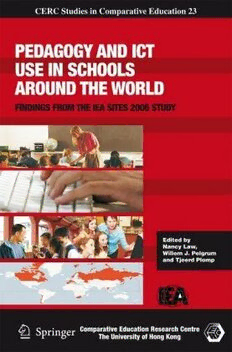
Pedagogy and ICT Use in Schools around the World: Findings from the IEA SITES 2006 Study (CERC Studies in Comparative Education) PDF
326 Pages·2008·4.918 MB·English
Most books are stored in the elastic cloud where traffic is expensive. For this reason, we have a limit on daily download.
Preview Pedagogy and ICT Use in Schools around the World: Findings from the IEA SITES 2006 Study (CERC Studies in Comparative Education)
Description:
The end of the last millennium was marked by rapid technological advances and deep changes in many aspects of human activity, often taken together as indicative of a shift into a knowledge era . Such changes have stimulated much discussion about the role and processes of education, and about the role of information and communication technology (ICT) in teaching and learning in this new era. Many policy documents relating to these themes have been published by international and regional organizations such as the European Commission, the European Roundtable of Industrialists, the Organization for Economic Cooperation and Development (OECD), UNESCO and the World Bank. Numerous blueprints on education reform and on ICT in education have also been set out by various governments since the mid-1990s. These policy initiatives brought with them a variety of strategic implementation priorities that differ from country to country, depending on the socio-economic and political context. Such educational strategies may involve, amongst others, changes in curriculum and/or assessment at the system level, provision for ICT infrastructure, teacher professional development, and/or technical and pedagogical support for teachers. Given the deep technological, economic and policy changes that have taken place over the last decade, are there indications that pedagogical practices are changing as well? What impact is the pedagogical use of ICT making in schools around the world? What is the impact of the implementation of these policies on pedagogy and ICT use in classrooms? These are the questions that this book addresses through an analysis of the findings from SITES 2006, an international comparative study of pedagogy and ICT use conducted under the auspices of the International Association for the Evaluation of Educational Achievement (IEA).
See more
The list of books you might like
Most books are stored in the elastic cloud where traffic is expensive. For this reason, we have a limit on daily download.
